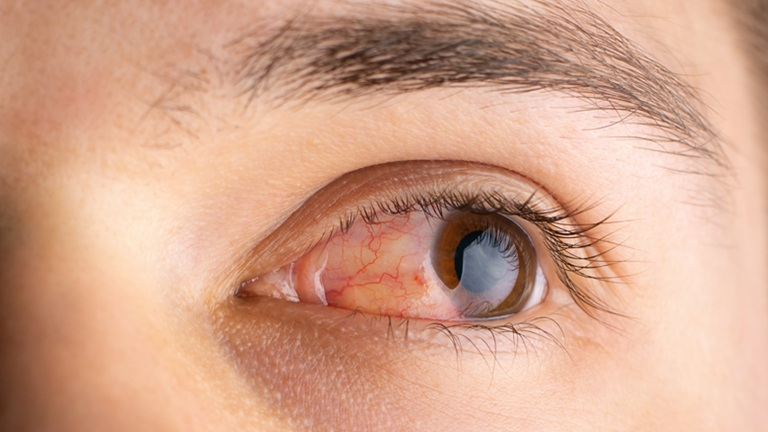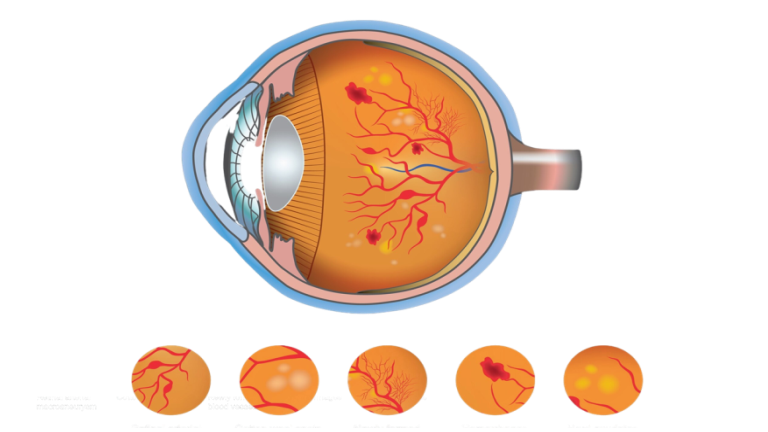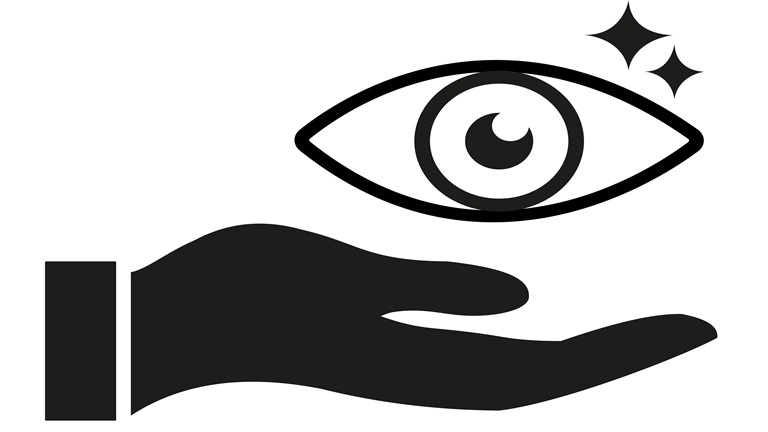Wrong Glasses, Real Problems: The Hidden Risks of Inaccurate Power Prescriptions
July 15, 2025
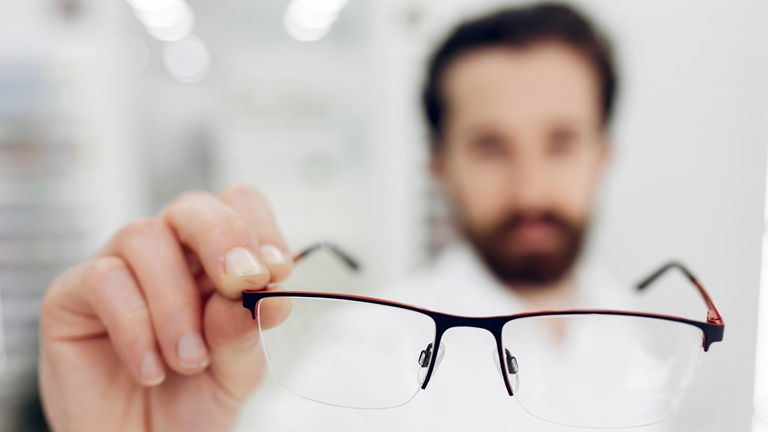
In India, millions wear glasses every day. Yet, a disturbing number of them are walking around with wrong prescriptions — not because of negligence, but because of incomplete, hurried, or inaccurate testing.
From metros like Bangalore and Mumbai to smaller towns and rural areas, people often skip proper eye checkups, heading instead to their neighborhood optical shops. While these outlets may offer convenience, they are not substitutes for a comprehensive eye evaluation by a trained ophthalmologist.
In fact, many eye hospitals in Bangalore consistently report cases where incorrect prescriptions have led to long-term vision issues, especially among children and working professionals.
In this blog, we’ll explore how inaccurate prescriptions are harming vision, how overlooked conditions like pseudomyopia and latent hypermetropia go undiagnosed, and why getting your eyes tested by a certified eye doctor is critical.
1. The Reality in India: Fast Glasses, Faulty Vision
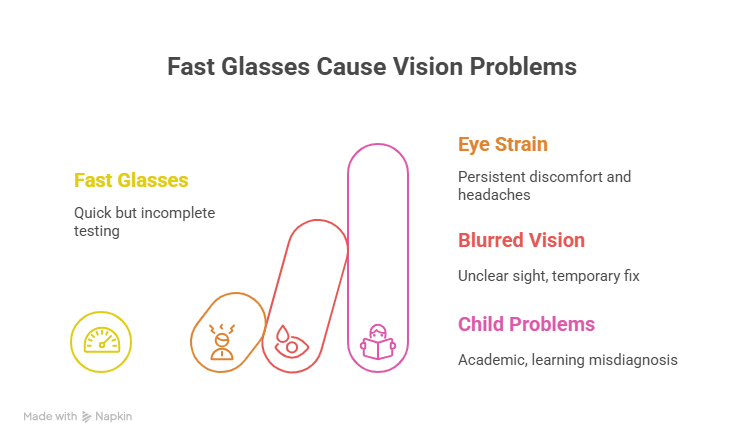
Walk into any urban or semi-urban market, and you’ll find optical shops offering glasses in “just 30 minutes.” While impressive, this speed often comes at the cost of thorough testing.
Most optical shops conduct only a basic subjective refraction — skipping key steps like cycloplegic refraction (which involves dilating the pupil), retinoscopy, or screening for underlying eye conditions. The result? Patients get glasses that temporarily improve clarity but do not address the root cause of their vision issues.
Common Practice, Serious Consequences:
- Prescriptions based only on a trial frame
- No dilatation for children and young adults (where it's critical)
- Skipping binocular vision checks or accommodation issues
This leads to persistent eye strain, headaches, blurred vision, and in children, even reduced academic performance or wrong diagnosis of learning difficulties.
2. The Why Accurate Refraction Matters Conditions: Pseudomyopia & Latent Hypermetropia
Many people are unknowingly suffering from conditions that basic refraction tests cannot detect:
Pseudomyopia
This is a condition where the eye overuses its focusing muscles (accommodation), causing temporary nearsightedness. Without cycloplegic refraction, it’s often mistaken for true myopia, leading to unnecessarily high minus power.
Latent Hypermetropia
This is the hidden portion of long-sightedness masked by the eye’s accommodation. When not tested under dilation, this condition gets missed — especially in children — resulting in eye fatigue, headaches, or even crossed eyes (strabismus).
Both conditions are rampant in India, particularly among school-going children and young adults. Early detection requires comprehensive eye exams by a qualified child eye specialist in Bangalore, not just a quick refraction at an optical shop.)
3. The Rural vs Urban Divide
In rural India, the problem is magnified. Access to ophthalmologists is limited. Mobile eye camps or visiting opticians may offer free glasses — a commendable effort — but often without proper diagnostic tools.
In urban metros, while access is better, the convenience culture has led to people choosing optical showrooms over clinics. Many assume that getting a new frame equals getting the right prescription — a dangerous misconception.
In both contexts, the result is the same:
Vision correction becomes transactional, not clinical.
4. Why Accurate Refraction Matters
An eye prescription isn’t just about making things look sharper — it’s about supporting the overall health and performance of your eyes.
Getting an accurate eye prescription in Bangalore goes beyond basic clarity; it directly impacts how children learn, how professionals work, and how seniors navigate the world safely.
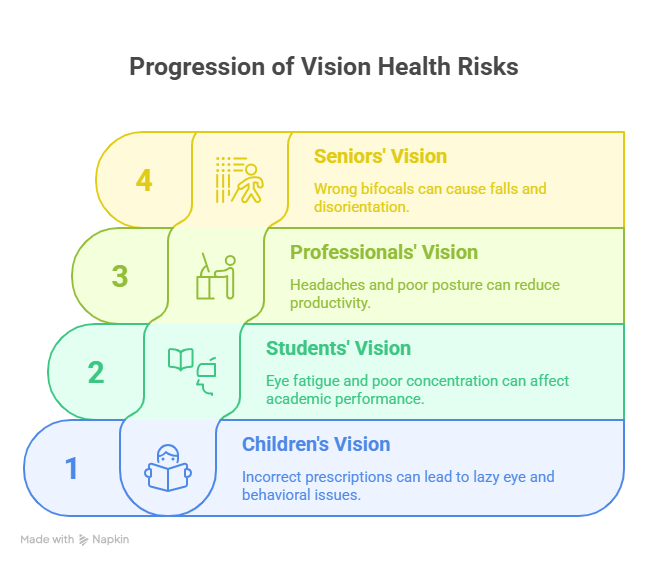
- In Children: Can cause lazy eye (amblyopia), eye misalignment, or behavioral issues
- In Students: Eye fatigue during reading, poor concentration, reduced academic scores
- In Professionals: Headaches, poor posture due to eye strain, lower productivity
- In Seniors: Wrong bifocal powers leading to falls, imbalance, or disorientation
A wrong power is not a minor mistake — it's a health risk.
5. Optical Shops vs. Eye Clinics: Know the Difference
| Aspect | Optical Shop | Eye Clinic (Like Sri Eye Care) |
|---|---|---|
| Refraction | Basic trial frame test | Comprehensive with dilatation, autorefractor, and retinoscopy |
| Eye Health Check | Rarely done | Retina, lens, cornea, IOP checked |
| Diagnosis | None for eye diseases | Detects issues like glaucoma, cataract, or keratoconus |
| Accuracy | Often hit-or-miss | Medically verified prescription |
| Follow-up | Uncommon | Monitored recovery & adjustments |
Who Should Do Your Eye Test?
Always an ophthalmologist or trained optometrist — not just a salesperson.
6. What You Should Expect in a Proper Eye Exam
At Sri Eye Care, a complete refraction includes:
- Case history and symptoms
- Vision testing (distance & near)
- Autorefraction + manual confirmation
- Cycloplegic dilation (especially for kids)
- Retinoscopy and binocular vision check
- Diagnosis of hidden conditions (if any)
- Prescription + lifestyle advice
This process takes 30–60 minutes — but the results are reliable, safe, and tailored to your eyes.
7. Expert Advice from Dr. Kaarthik Sriprakash
“As an experienced eye surgeon in Bangalore, I’ve seen countless cases where the root of the problem wasn’t a disease — it was an incorrect glasses prescription given without proper testing. A trial frame alone cannot replace a comprehensive eye evaluation. Especially in children and young adults, missing conditions like pseudomyopia or latent hypermetropia can lead to years of avoidable discomfort and vision stress.”
“We encourage every patient — whether they’re coming for glasses or general eye strain — to undergo a full cycloplegic refraction when needed. Vision deserves precision. And only a trained ophthalmologist or optometrist can ensure that.”
— Dr. Kaarthik Sriprakash, MS (Ophthal), Consultant Cataract & Refractive Surgeon, Sri Eye Care
8. The Takeaway: Don’t Settle for Quick Fixes
Eyewear is not just about looking good — it’s about seeing right. A misprescribed power is like wearing the wrong dose of medicine every day. It may not kill you — but it will harm your well-being.
Before you buy your next pair of glasses, ask yourself:
- Was my eye tested under dilation?
- Was the refraction confirmed by a qualified eye care provider?
- Was my eye health evaluated — not just my eyesight?
If the answer is no, visit a trusted eye clinic like Sri Eye Care.
Final Word: Your Vision Deserves Precision
India’s growing dependence on quick optical fixes is costing us more than we realize. Vision is too valuable to be compromised by shortcuts.
Look forward to clarity, confidence, and care — with experts who see the full picture. Choose accuracy. Choose expertise. Choose Sri Eye Care.
Take Action Today
📞 Call: 080-6821-2843 | Visit www.srieyecarehospital.com

